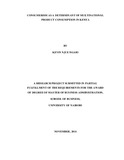| dc.description.abstract | Consumerism is defined as an economic and social dogma that promotes social and
economic acquirement of goods and services above and beyond your basic needs and
in greater amounts. Consumer demand is now recognized as the engine of most
developing economies and investment surge, and analysts have predicted that the
middle class buyers with swelling disposable income as fuelling this boom and as a
result, expanding the net of consumers for market hungry multinationals. The
objective of this study was to determine how consumerism acts as a stimulus in the
consumption of multinational products in Kenya and how they influence this process
and accompanying elements that encourage consumption especially in acquisition of
bank loans, credit cards, motor vehicles, and retail spending. To achieve the objective
of this study, the research used a descriptive study, the population of this study was
drawn from multinationals operating in Kenya from the following sectors; Retail and
shopping, Alcoholic Beverages, Banking, and Automobile and Accessories. These
were as provided by the East Africa’s top 100 companies as listed in issue 6, August
2014 East Africa’s top 100 newsletter. A sample of 40 respondents was used who
included: the Finance managers, Business Development managers, and marketing
managers of the respondent multinationals namely Nakumatt, Toyota Kenya, East
African Breweries, and Equity Bank who were selected. The 40 respondents were
selected using systematic random sampling. Data collection involved both qualitative
and quantitative forms of data collection techniques. Secondary data was obtained
from financial records and the Kenya National Bureau of Statistics reports. Primary
data was collected by use of a semi structured questionnaire. The data was analyzed
using descriptive statistics in form of percentages, mean and standard deviation to
determine consumerist patterns. The results of the analysis showed the highest amount
of consumption by customers ranged between Kshs 30,000 to Kshs 49,999; this was
explained by 29% of the respondents; Least amount of consumption that was found to
be 1% for those who spent over Kshs 100,000. This was a clear signal that most
consumers of multinational products spent between Kshs 30,000 to Kshs 49,999
monthly. Similarly, the chief motivational factor that was perceived to influence their
purchasing decisions was found to be advertisement which according to the findings,
showed that 94% of the respondents agreed that advertisement played a greater role in
purchasing and shopping decision. The other factors that were perceived to influence
purchasing decisions were after sales service, word of mouth, celebrity endorsement
and festivals and promotions. It was concluded that Consumerism highly influenced
consumption of multinational products in Kenya. The study recommended that the
Central Bank of Kenya, through prudent economic policies, sustains a stable
macroeconomic environment that will support access to consumer credit hence
enabling more consumption of multinational products leading to economic growth.
Also, Kenya National Poison Board should put proper measures to ensure that all the
organizations handling consumer products abide by the stipulated regulations and
procedures in order to create an enabling environment that will lead to increased
consumption of their products. | en_US |

